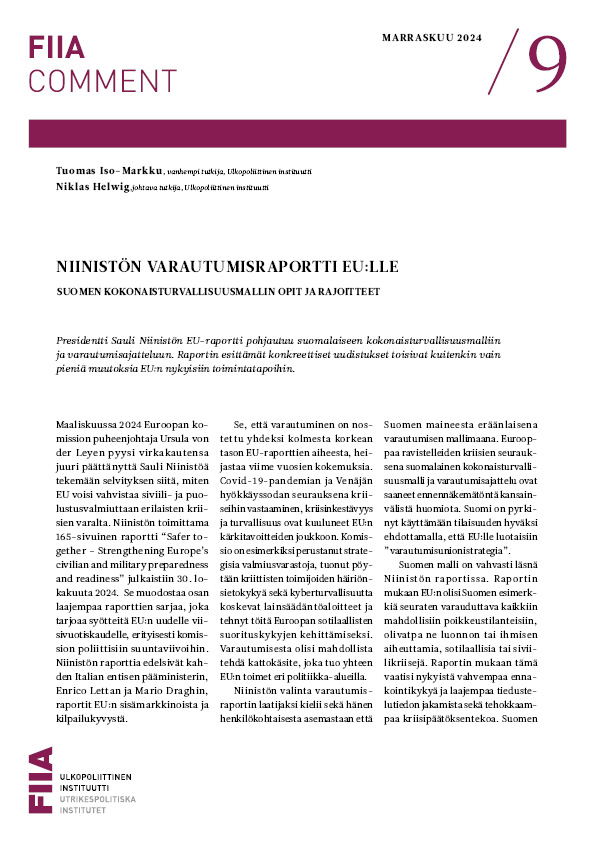The role of the rotating Council presidency in the EU’s external affairs has diminished considerably. Yet the most visible priority for the Lithuanian presidency is the EU’s Eastern Partnership. Working through the EU institutions, Lithuania is aiming to shape Europe’s geopolitical map for decades to come.
A key goal of the Lithuanian presidency during the second half of 2013 has been to anchor the largest of the six Eastern partners, Ukraine, to the EU. Lithuania wants the EU to sign an association agreement, including deep and comprehensive free trade, with Ukraine at the Eastern Partnership Summit in Vilnius in late November. The Lithuanian policy is driven by a sense of urgency; its mission is to pull Ukraine back from the brink of falling under Russia’s political and economic control. Failure to do so, it fears, would bolster imperialist and authoritarian tendencies in Russia.
Another closely related priority is energy security, notably the creation of a single EU energy market. As Lithuania’s plans to build a new nuclear power plant have run into difficulties, it has become all the more important to reduce dependence on Russian energy through European market integration and new electricity connections. This is linked to the goal of the Eastern Partnership to extend the EU’s energy market to neighbouring countries, which is of major interest to Ukraine and Moldova.
The two countries have already joined the EU’s Energy Community Treaty, but their energy dependence on Russia makes them vulnerable to Moscow’s use of gas supplies as a lever to exert political pressure.
Not everyone in the EU is in complete agreement with Lithuania’s approach to the Eastern neighbourhood. The baggage of being known as a troublemaker in EU-Russia relations has done little to further the Lithuanian case.
Unlike Estonia and Latvia, which share the concern over Russia’s regional ambitions but have sought a more conciliatory tone in the EU, Lithuania has not stopped short of acting as a veto power. Back in 2008, Lithuania tried to block EU-Russia negotiations on a new agreement twice, insisting on a tougher EU stance on energy security and the protracted conflicts of Georgia and Moldova.
While Lithuania pursues a geopolitical vision, the EU is having a hard time arguing that it has not entered a geopolitical battle with Russia over the common neighbourhood. From the EU’s point of view the Eastern Partnership is not aimed at weakening Russia, but at supporting the stable and democratic development of the Eastern neighbours.
At the same time, Brussels largely shares the view that the EU needs to engage more actively in the region. Lithuania has been working closely with the EU institutions, starting well before its presidency to plan a full calendar of Eastern Partnership events during the six months of its presidency, and a list of ‘deliverables’ ranging from the conclusion of association agreements to building closer ties between the EU and local civil society organisations. Under the Lisbon Treaty, the member state holding the Council presidency no longer chairs the Council meetings in the field of external affairs, but it can still take part in agenda-shaping and play an active role in generating common positions.
It has not been easy to convince all the member states about the need to prioritize the Eastern neighbourhood. Ukraine has been sliding deeper into authoritarianism over the past few years. In the hope of signing the association agreement, it has made some recent, but half-baked attempts to meet the EU’s conditions concerning the rule of law and electoral legislation. It has also made it clear that it is not interested in joining the Russian-led Customs Union, which casts into doubt the Lithuanian fear that Ukraine might be ‘lost’ to Russia. The EU has postponed its decision on whether the association agreement will be signed at the Vilnius Summit, waiting for Ukraine to do more to meet the conditions.
Over the past few months, Russia has done a lot to help Lithuania make its case. Trying to block the signing of association agreements, it has imposed unjustified trade restrictions on Ukraine and Moldova. Lithuania has been a target of similar pressure, including a ban on imports of Lithuanian dairy products. The European Commission has promised to bring this issue to the WTO unless Russia drops the ban. It is obviously of huge importance for Lithuania to address this issue through the EU and gain the Commission’s backing.
It is too early to say whether Lithuania’s efforts to invigorate the Eastern Partnership will lead to a historic success or a bitter failure. Lithuania may be wrong in believing that the moment for signing the EU-Ukraine agreement is now or never. But it deserves credit for pushing the EU to take a more active role in the region. A mix of Lithuania’s activeness, the EU’s conditionality and Russian threats might push Ukraine to take domestic reforms more seriously.
What Lithuania has proved is that a small and peripheral member state can shape the EU agenda. It has also proved that the country holding the Council presidency can still make a difference to the EU’s external relations, although its direct role in running the show has been largely taken over by the High Representative and the European External Action Service.
Lithuania has learned to work with and through the EU institutions, which is usually a more successful approach than acting as a veto power. Even in its post-Lisbon, more limited shape, the rotating presidency has important functions in the EU system: it gives each member state a period of privileged access to the institutions and strengthens the ownership of member states towards the EU.









